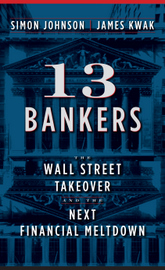The Baseline Scenario
What happened to the global economy and what we can do about it
Falling Back On Waterloo
By Simon Johnson, 13 Bankers: The Wall Street Takeover and The Next Financial Meltdown
The bank lobbyists have the champagne out – the Brown-Kaufman amendment, which would have capped the size and leverage of our largest banks – was defeated in the Senate last night, 33-61. Feeling ascendant, the big banks swarm forward to take on their next foe – the Kanjorski amendment (that would greatly strengthen the power of regulators to break up megabanks), which they plan to gut in the backrooms.
This is overconfidence – because the consensus against them is beginning to shift significantly. Partly this is the result of great efforts by Senator Ted Kaufman, Senator Sherrod Brown, and their colleagues over recent months and weeks. Partly this is due to all the people who came on board and pushed hard.

But, as in many such cases, it is also a question of luck – and timing.
The European sovereign debt crisis is deepening. And the picture that is worth many thousands of words is the NYT’s graph of interlocking debt within the eurozone.
As far as anyone can ascertain, this is almost all debt held by banks (often then “repo-ing”, or borrowing against it as collateral, at the European Central Bank.)
In other words, the European megabanks – lauded by Senators Dodd, Corker, Warner and others as a model for us to follow – are up to the eyeballs in bad debt. Their governance has completely failed. Their regulatory systems have been gutted – on their way to being turned into ash.
None of this would matter, of course, if the eurozone policy elite had its act together and could terminate its current position with minimal losses. But it cannot – the deer are in the headlights.
Ask everyone this question: Which are the huge global banks that Senator Dodd, Jamie Dimon, and Larry Summers think we should be emulating? Surely not the Chinese – their governance failures are profound and complete; this is state banking run amok. Surely not the British – after all Mervyn King and Adair Turner, the top authorities on those banks, are globally the most articulate officials on how good finance has gone so deeply wrong. Surely not the Canadians – those myths have been long exploded (and without dissent, in our conversations with the Bank of Canada).
And surely you are not proposing that the continental European banks are a model of anything other than ineptness, blind herding, and the transition from being “too big to fail” to “so big that even when you save them, you get an economic catastrophe”?
To the victors last night in the Senate: congratulations – your opponents have fallen back. Your generals are known to be invincible, your forces are the best, and your resources are without limit.
And so we wait for you again, on a gentle slope and behind a ridge – appropriately enough with our backs to Brussels. Welcome to Waterloo.




